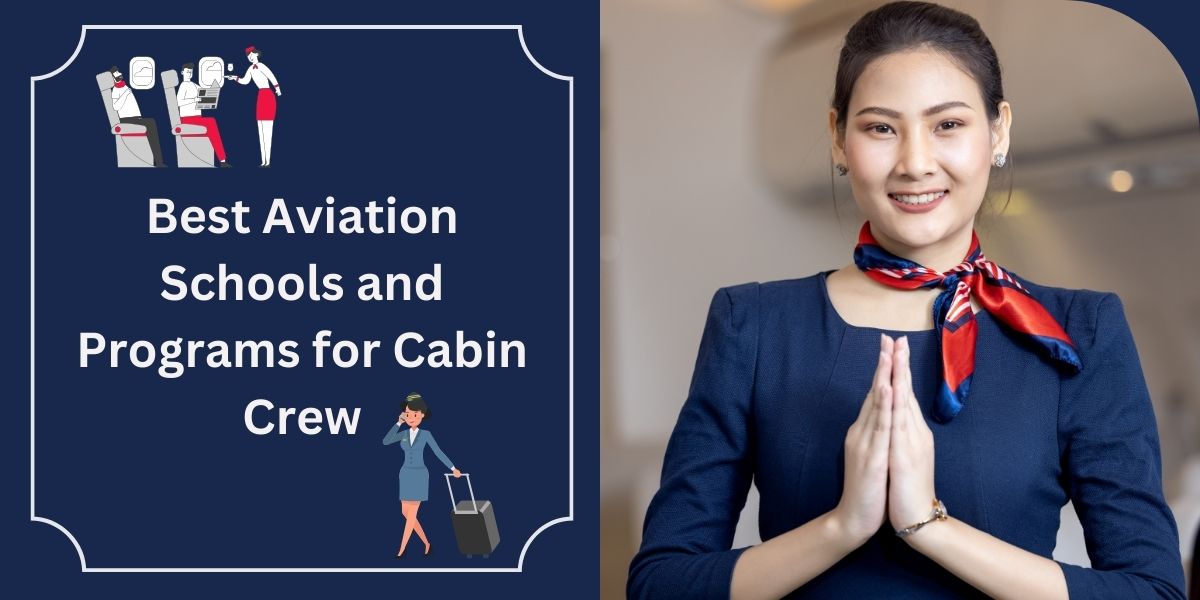Taking a career course as a cabin crew is an exciting journey, and choosing the right aviation school lays the foundation for a successful and fulfilling adventure in the skies.
Students who complete a course in cabin crew often go on to become airline flight attendants, and there is a lot of opportunity for growth within that field. Some students may also be interested in becoming travel writers, as they get to experience the world and learn the inside tips that come from working at an airline.
Embarking on a career and taking a course as a cabin crew requires not just a passion for aviation but also the right training from reputable institutions. In this article, we will discuss the 10 best aviation schools and programs that stand out in preparing individuals for the dynamic and demanding role of cabin crew.
What are the duties of the cabin crew?
They are in charge of the area from the cockpit door to the rear kitchen area. The cabin crew is not responsible for anything outside the aircraft or inside the cockpit. Here’s an outline of their duties:
- The cabin crew can intervene in normal and emergency situations. They close the exit doors located on the left and right sides of the aircraft by following the instructions.
- Hosts and hostesses are also entrusted with opening the emergency exit door in case of an emergency. Passengers sitting in the seat next to the emergency exit doors are also considered to be responsible.
- When the necessary materials are loaded into the aircraft, the duty of the cabin crew varies from company to company.
- The job description of hosts and hostesses regarding service duties also varies depending on the companies. On some airlines, the cabin crew deals with all the passengers’ requests, and on some airlines, they are to only start the buffet service for passengers at certain times.
- The main task of the cabin crew is to explain to passengers what to do in case of an emergency, both auditory and visual.
- Hosts and hostesses are also obligated to provide passengers with the necessary information about the journey.
10 Best Aviation Schools and Courses for Cabin Crew
If you want to take your first steps in the aviation industry, taking a course and completing cabin crew training is essential.
We’ve compiled a list of the top 10 aviation schools, along with their entrance requirements and training information.
1. Lufthansa Aviation Training
Location: Hallbergmoos, Germany (HQ)
Lufthansa Aviation Training is one of the best schools to take an aviation course for cabin crew. It allows students to experience inflight service through flight service mock-ups that simulate the actual working conditions during travel.
Those who enroll in the course will be taught about the various aspects of an aircraft, such as managing onboard security cameras, and will be prepared for even the most difficult situations.
Focusing on specialized human factor training, you will learn analytical thinking methods to help you react and effectively manage complex decision-making situations during a flight.
2. CAE
Location: Montreal, Canada (HQ)
With training facilities in 35 countries, CAE offers specialized cabin crew programs in these locations: Amsterdam, Barcelona, Copenhagen, Madrid, Oslo, and Stockholm.
In Madrid and Barcelona, you will have the choice of either Wamos or Vueling cabin crew programs, with a two-week mandatory cabin crew course required to obtain attestation to enable applicants to work for any airline in European territory.
Students cover everything from security demonstrations to how to act in case of emergencies and are trained in European Aviation Safety Agency (EASA) regulation standards throughout the course.
3. Ethiopian Aviation Academy
Location: Addis Ababa, Ethiopia
The Ethiopian Aviation Academy provides basic and recurrent cabin crew programs that combine classroom and practical training offered by dedicated instructors. Specializing in aircraft from Boeing, Bombardier, and Airbus, you will be required to learn rigorous safety standards while also training to offer the highest standard of customer service.
Those looking to take their training one step further can also enroll in specialized courses covering crew resource management, leadership, and premium customer service that feature on-the-job training.
Catering training programs are also available for those looking to specialize in onboard food handling, with extensive courses covering basic aviation catering, hazard analysis critical control point (HACCP), and food and beverage control.
4. BAA Training
Location: Vilnius, Lithuania
An independent aviation training center headquartered in Vilnius, Lithuania, BAA Training offers training options for new candidates and existing cabin crew members looking to enhance their skills.
BBA Training also offers specialized firefighting and smoke procedure training, and students have the opportunity to gain experience in aircraft emergency exit and slide operations.
VIP cabin crew training is also available for those who wish to specialize in working with public figures and celebrity clients. This is a four-day course covering everything from maintaining professional style with exclusive makeup and grooming lessons to learning how to deliver exceptional service while exceeding clients’ expectations.
5. Sevenair Academy
Location: São Domingos de Rana, Portugal
Created in partnership with a leading airline in Portugal, Sevenair Academy is a specialized training center for cabin crew courses. It provides four supplementary days of training based in Santa Maria, Azores, with both travel and accommodation included in the overall price.
You must be in good health and physical condition and have a good stress tolerance. English-language knowledge is mandatory, as is the ability to swim. Those who enroll in the course will also be expected to pass a medical examination.
Upon completion, of course, all students will have the chance to be hired by Sevenair Academy’s airline partners, with several national and international open days taking place each year, specifically designed for recruitment.
6. AFA (Atlantic Flight Academy)
Location: Istanbul, Turkey
Established in 2011, the AFA provides cabin crew training per national and international rules. To apply, you must be at least 18 years old and hold a high school diploma or equivalent.
Additionally, you must know intermediate-level English at the very least. It is also essential that students hold a valid Class 2 health certificate. This is issued by aviation medical centers and is authorized by the General Directorate of Civil Aviation.
In total, as an AFA trainee, you can expect at least 60 hours of theory training with an additional two hours of mock-up application training, access to national and international aviation rules, as well as textbooks from different sources around the world in AFA’s dedicated onsite library.
7. Skies Aviation Academy
Location: Thessaloniki, Greece
Approved by the Hellenic Civil Aviation Authority, the Skies Aviation Academy cabin crew training course allows successful trainees to work as cabin crew members on Greek and international airlines.
The course covers a wide range of areas, from passenger handling and crowd control to safety and security procedures. You will also need to undergo a swimming test as part of your practical training induction.
To complete the course successfully, you will need to log in for a total of 136 hours. Upon completion, you will receive the ‘Cabin Crew Attestation’ approved by the Hellenic Civil Aviation Authority. Extra support is also provided once the course has been completed, including interview preparation and support during the application process for cabin crew jobs.
8. IFA Aviation Training Center
Location: São Domingos de Rana, Portugal
The IFA Aviation Training Center offers an intensive theoretical and practical program that enables candidates to get certified as flight attendants in commercial aviation. Students who enroll in the cabin crew training course will cover areas such as aviation legislation, safety, and emergency procedures that every professional cabin crew attendant should be aware of.
Evacuation drills, first aid, and crew resource management are also extensively covered throughout the training course, which takes approximately three weeks to complete.
You also get to choose between two different locations, Cascais and Viseu, to undertake your theoretical training. Meanwhile, practical training is conducted on dedicated facilities near the IFA aviation training center based in the Greater Lisbon subregion.
Proficiency in English, a high school diploma, and the ability to swim are all crucial requirements to enroll in the IFA aviation training course.
9. OMNI Aviation Training Center
Location: São Domingos de Rana, Portugal
The OMNI Aviation Training Center provides students with the opportunity to train and become licensed flight attendants and offers native professionals the chance to learn English in a specialized course.
To enroll in the flight attendant course, you will need to have completed at least year 12 of education. You will also need to provide full identification documentation as part of the course enrollment process. This will include your criminal record, if any, and your tax identification number.
10. Signa Aviation Services
Location: Windhoek, Namibia
Based at Eros International Airport, Signa Aviation Services is a flight and cabin crew training school that offers students with no previous aviation experience the chance to become a Namibian or South African qualified cabin crew member.
To enroll in the course, you must meet pre-entry requirements, which include holding a Namibian and South African Aviation Medical Class 3 certificate and completing the twelfth grade of school.
You will also need to meet physical requirements, such as having a minimum height of 1.56m. You must also be able to swim. The course takes six weeks to complete, with successful students being awarded a Namibian and South African cabin crew license upon completion.
How to Become a Cabin Crew Member
If you want to become a cabin crew member for an airline, here are some steps you can take:
1. Research the career
Researching the working hours, conditions, salary, and other factors of a career as a cabin crew member can help you solidify your career goals. The average base salary for a flight attendant is $34,977 per year. A senior flight attendant can make $96,185 per year. Benefits can include health care, free or discounted air travel, and accommodation discounts.
Airlines have certain physical requirements for cabin crew, including a height range and color vision. Height ranges for cabin crew vary between airlines, but in general, they require that you can comfortably reach the overhead bins in airplanes and can stand in an airplane without having to stoop. Flight attendants can assist passengers with lifting and arranging luggage in an overhead bin, so physical strength can help you get a job as a flight attendant.
Working conditions for cabin crew can include long hours on international flights and an irregular schedule that includes working early mornings, late nights, weekends, and holidays. A career as a cabin crew member can also require you to relocate.
2. Gain customer service experience
A cabin crew job for an airline can require skills and experience in customer service. Working in a customer service position can give you transferable skills for working on airplanes. Here are some customer service skills you can use as a cabin crew member:
- Communication: Customer service experience can give you communication skills that you can use to speak with airline customers.
- Conflict resolution: Working in customer service can help you solve conflicts between coworkers or customers. You can transfer these skills to a cabin crew job, where you may routinely have to settle disputes among passengers and diffuse tense situations.
- Leadership: A customer service job can help you develop leadership skills, which can help you carry out the required duties in a cabin crew position.
- Working under pressure: A cabin crew job can require you to stay calm during emergencies and multitask to complete your duties. Customer service experience can give you skills for working under pressure.
- Teamwork: Customer service jobs can give you experience collaborating with others. You can use this experience when working with other cabin crew members.
3. Attend flight attendant school
Optionally, you can attend flight attendant school to gain the knowledge and skills you need to become a cabin crew member. Flight attendant programs usually last about three months. Below is a list of knowledge and skills you can learn in flight attendant school:
- Aircraft types: You can learn about the types of aircraft you can serve on as a cabin crew member.
- First aid: Flight attendant school can teach you the basics of first aid, as well as injuries that are likely on planes.
- Interference: You can learn what to do when passengers don’t follow safety regulations aboard a flight.
- Dangerous materials: You can learn about identifying and addressing dangerous materials on an aircraft.
- Food handling: Flight attendant schools can give you food handling knowledge to ensure passengers’ food is safe to consume.
4. Fulfill job requirements
Next, you can ensure that you fulfill the requirements to become a cabin crew member for an airline. Here are some basic requirements for cabin crew:
- Education: You can earn a high school diploma or GED to fulfill the basic education requirements of a cabin crew member.
- Age: Some airlines hire cabin crew members as young as 18, while others require cabin crew to be at least 21.
- Physical requirements: Cabin crew can be required to meet height, weight, strength, and stamina requirements.
- Background check: Airlines can require cabin crew members to undergo a screening for identity verification, criminal records, education confirmation, and other personal details.
- Travel documentation: Cabin crew members can obtain identification and other travel documentation, like passports, to work on airplanes.
5. Obtain application photos
An application for a cabin crew member job can require you to submit photos of yourself, usually a headshot and a full-length photo. Here are some tips to fulfill this requirement:
- Follow the instructions: Note the required photo dimensions to ensure you submit the correct photos.
- Dress professionally: Choosing professional outfits for application photos can help you make a positive impression during the interview process.
- Seek a professional photographer: A professional photographer can help you meet the requirements of application photos, like a white background, and ensure that the photos have proper lighting and resolution.
- Note the file type and size: If you’re submitting application photos online, you can ensure the photos are within the file type and size requirements to ensure successful submission.
6. Create a resume
Once you have fulfilled the requirements for a cabin crew position and gained customer service experience, you can create a resume for flight crew jobs. You can include the following on a cabin crew resume to help you get an interview:
- Customer service experience: You can list customer service experience on your resume to show hiring managers your customer service skills.
- Education: List your highest education level and flight attendant school (if applicable).
- Languages: You can list the languages you’re learning and your proficiency score in fluent languages to help you compete against other cabin crew applicants.
- Keywords: Including keywords from the job posting in your resume can help your resume pass a company’s applicant tracking system scan.
7. Apply to cabin crew jobs
If you’ve followed the above steps, you can use your resume to apply for cabin crew positions. You can search for openings on airline websites and aviation-related job boards.
The application process for cabin crew members can include a pre-employment test that measures your personality, an initial job interview, and an employment event. The employment event can include screenings for cabin crew positions based on role-playing and group discussions with other cabin crew applicants. Another round of interviews can follow the employment event.
After you get a cabin crew job, most airlines require several hours of training on safety, customer service, teamwork, and corporate policies before you begin working on flights. You can also earn government certifications through airline training programs.
Conclusion
A career as a cabin crew member can be stressful, but students gain skills throughout their education that are useful even beyond their work with airlines. The ability to work well under pressure, to communicate with people despite language barriers, and to stay healthy while constantly traveling are all invaluable skills.
Choosing the right aviation school and course is a crucial step toward a successful career as a cabin crew. These institutions not only impart the necessary skills but also instill the values and professionalism required for a rewarding journey in the aviation industry.




 Jobi.ng
Jobi.ng


